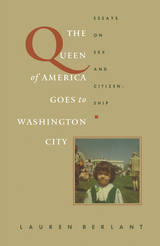2 start with Q start with Q

In 1953, reflecting on early ventures in quantum theory, J. Robert Oppenheimer spoke of terror and exaltation, of history happening in a realm so remote from common experience that it was “unlikely to be known to any poet or historian.” Yet now, anyone can Google “quantum theory” and find more than 34 million entries—from poets and historians, certainly, as well as film critics and Buddhist monks. How—and how pervasively—quantum mechanics has entered the general culture is the subject of this book, an engaging, eclectic, and thought-provoking look at the curious, boundlessly fertile intersection of scientific thought and everyday life.
Including recollections of encounters with the theory and the people responsible for it, Jeremy Bernstein’s account ranges from the cross-pollination of quantum mechanics with Marxist ideology and Christian and Buddhist mysticism to its influence on theater, film, and fiction. Along the way, Bernstein focuses on those—such as Niels Bohr, the Dalai Lama, W. H. Auden, and Tom Stoppard—who have made quantum physics; who have argued over it, pondered it, or taken literary inspiration from it, and who have misunderstood, misconstrued, or misapplied it. One person in particular supplies a narrative thread: John Bell, a notable yet underappreciated physicist who did groundbreaking research in quantum physics. In Bell’s story, Bernstein provides a uniquely readable account of what physicists call the “measurement problem.”
Quantum Leaps is a lively, erudite book on a subject that Bernstein has lived with for most of its history. His experience and deep understanding are apparent on every page.

As Berlant traces the guiding images of U.S. citizenship through the process of privatization, she discusses the ideas of intimacy that have come to define national culture. From the fantasy of the American dream to the lessons of Forrest Gump, Lisa Simpson to Queer Nation, the reactionary culture of imperilled privilege to the testimony of Anita Hill, Berlant charts the landscape of American politics and culture. She examines the consequences of a shrinking and privatized concept of citizenship on increasing class, racial, sexual, and gender animosity and explores the contradictions of a conservative politics that maintains the sacredness of privacy, the virtue of the free market, and the immorality of state overregulation—except when it comes to issues of intimacy.
Drawing on literature, the law, and popular media, The Queen of America Goes to Washington City is a stunning and major statement about the nation and its citizens in an age of mass mediation. As it opens a critical space for new theory of agency, its narratives and gallery of images will challenge readers to rethink what it means to be American and to seek salvation in its promise.
READERS
Browse our collection.
PUBLISHERS
See BiblioVault's publisher services.
STUDENT SERVICES
Files for college accessibility offices.
UChicago Accessibility Resources
home | accessibility | search | about | contact us
BiblioVault ® 2001 - 2024
The University of Chicago Press









